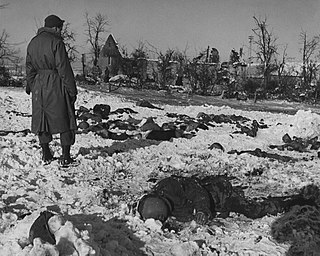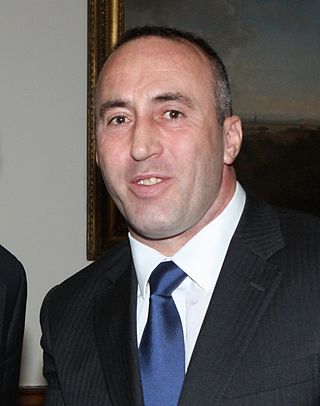Related Research Articles

The International Criminal Tribunal for the former Yugoslavia (ICTY) was a body of the United Nations that was established to prosecute the war crimes that had been committed during the Yugoslav Wars and to try their perpetrators. The tribunal was an ad hoc court located in The Hague, Netherlands.

A war crime is a violation of the laws of war that gives rise to individual criminal responsibility for actions by combatants in action, such as intentionally killing civilians or intentionally killing prisoners of war, torture, taking hostages, unnecessarily destroying civilian property, deception by perfidy, wartime sexual violence, pillaging, and for any individual that is part of the command structure who orders any attempt to committing mass killings including genocide or ethnic cleansing, the granting of no quarter despite surrender, the conscription of children in the military and flouting the legal distinctions of proportionality and military necessity.

Crimes against humanity are widespread or systemic criminal acts which are committed by or on behalf of a de facto authority, usually by or on behalf of a state, that grossly violate human rights. Unlike war crimes, crimes against humanity do not have to take place within the context of wars, and they apply to widespread practices rather than acts which are committed by individuals. Although crimes against humanity apply to acts which are committed by or on behalf of authorities, they do not need to be part of an official policy, and they only need to be tolerated by authorities. The first prosecution for crimes against humanity took place during the Nuremberg trials. Initially considered for legal use, widely in international law, following the Holocaust, a global standard of human rights was articulated in the Universal Declaration of Human Rights (1948). Political groups or states that violate or incite violations of human rights norms, as they are listed in the Declaration, are expressions of the political pathologies which are associated with crimes against humanity.

Victor's justice is a term which is used in reference to a distorted application of justice to the defeated party by the victorious party after an armed conflict. Victor's justice generally involves the excessive or unjustified punishment of defeated parties and the light punishment of or clemency for offenses which have been committed by victors. Victors' justice can be used in reference to manifestations of a difference in rules which can amount to hypocrisy and revenge or retributive justice leading to injustice. Victors' justice may also refer to a misrepresentation of historical recording of the events and actions of the losing party throughout or preceding the conflict.

Richard Joseph Goldstone is a South African former judge. After working for 17 years as a commercial lawyer, he was appointed by the South African government to serve on the Transvaal Supreme Court from 1980 to 1989 and the Appellate Division of the Supreme Court of South Africa from 1990 to 1994.

The Russell Tribunal, also known as the International War Crimes Tribunal, Russell–Sartre Tribunal, or Stockholm Tribunal, was a private People's Tribunal organised in 1966 by Bertrand Russell, British philosopher and Nobel Prize winner, and hosted by French philosopher and writer Jean-Paul Sartre, along with Lelio Basso, Simone de Beauvoir, Vladimir Dedijer, Ralph Schoenman, Isaac Deutscher and several others. The tribunal investigated and evaluated American foreign policy and military intervention in Vietnam.

The Bosnian genocide refers to either the Srebrenica massacre or the wider crimes against humanity and ethnic cleansing campaign throughout areas controlled by the Army of Republika Srpska (VRS) during the Bosnian War of 1992–1995. The events in Srebrenica in 1995 included the killing of more than 8,000 Bosniak men and boys, as well as the mass expulsion of another 25,000–30,000 Bosniak civilians by VRS units under the command of General Ratko Mladić.

Allama Delwar Hossain Sayeedi is a Bangladeshi Islamic scholar, former politician and lecturer, who served as a Member of Parliament representing the Pirojpur-1, Barisal, constituency during 1996 till 2006.

Ramush Haradinaj is a Kosovo Albanian politician, leader of the AAK party, and the third prime minister of Kosovo. He is a former officer and leader of the Kosovo Liberation Army (KLA), and previously served as Prime Minister of Kosovo between 2004 and 2005.

The state of human rights in the Islamic Republic of Iran has been criticized by Iranians and international human rights activists, by writers, and NGOs. The United Nations General Assembly and the Human Rights Commission have condemned prior and ongoing abuses in Iran in published critiques and several resolutions. The government is criticized both for restrictions and punishments that follow the Islamic Republic's constitution and law, and for "extrajudicial" actions by state actors, such as the torture, rape, and killing of political prisoners, and the beatings and killings of dissidents and other civilians. Capital punishment in Iran remains a matter of international concern.

In the practice of international law, Command responsibility is the legal doctrine of hierarchical accountability for war crimes, whereby a commanding officer (military) and a superior officer (civil) is legally responsible for the war crimes and the crimes against humanity committed by his subordinates; thus, a commanding officer always is accountable for the acts of commission and the acts of omission of his soldiers.

A series of mass executions of political prisoners ordered by Ayatollah Khomeini and carried out by Iranian officials, took place across Iran, starting on 19 July 1988 and continuing for approximately five months. The killings took place in at least 32 cities across the country, and estimates of the number killed range from 2,500 to 30,000, many of whom were also subject to torture. The majority of those who were killed were supporters of the People's Mujahedin of Iran (MeK), but supporters of other leftist factions, including the Fedaian and the Tudeh Party of Iran, were also executed.

The Special Tribunal for Lebanon (STL), also referred to as the Lebanon Tribunal or the Hariri Tribunal, is a tribunal of international character applying Lebanese criminal law to carry out the investigation and prosecution of those responsible for 14 February 2005 assassination of Rafic Hariri, the former Lebanese prime minister, and the deaths of 21 others, as well as those responsible for connected attacks.

The Extraordinary Chambers in the Courts of Cambodia, commonly known as the Cambodia Tribunal or Khmer Rouge Tribunal (សាលាក្ដីខ្មែរក្រហម), was a court established to try the senior leaders and the most responsible members of the Khmer Rouge for alleged violations of international law and serious crimes perpetrated during the Cambodian genocide. Although it was a national court, it was established as part of an agreement between the Royal Government of Cambodia and the United Nations, and its members included both local and foreign judges. It was considered a hybrid court, as the ECCC was created by the government in conjunction with the UN, but remained independent of them, with trials being held in Cambodia using Cambodian and international staff. The Cambodian court invited international participation in order to apply international standards.

Joint criminal enterprise (JCE) is a legal doctrine used during war crimes tribunals to allow the prosecution of members of a group for the actions of the group. This doctrine considers each member of an organized group individually responsible for crimes committed by group within the common plan or purpose. It arose through the application of the idea of common purpose and has been applied by the International Criminal Tribunal for the former Yugoslavia to prosecute political and military leaders for mass war crimes, including genocide, committed during the Yugoslav Wars 1991–1999.

William Anthony Schabas, OC is a Canadian academic specialising in international criminal and human rights law. He is professor of international law at Middlesex University in the United Kingdom, professor of international human law and human rights at Leiden University in the Netherlands, and an internationally respected expert on human rights law, genocide and the death penalty. Schabas has been described as "the world expert on the law of genocide and international law."

Payam Akhavan is an Iranian-born lawyer. He is a Member of the Permanent Court of Arbitration at The Hague. He is a senior fellow at Massey College at the University of Toronto and is a visiting adjunct at the school's Faculty of Law. He is also a senior fellow at the Raoul Wallenberg Centre for Human Rights.

Numerous war crimes were committed by all sides during the Kosovo War, which lasted from early 1998 until 11 June 1999. According to Human Rights Watch, the vast majority of abuses were attributable to the government of Slobodan Milošević, mainly perpetrated by the Serbian police, the Yugoslav army, and Serb paramilitary units. During the war, regime forces killed between 7,000–9,000 Kosovar Albanians, engaged in countless acts of rape, destroyed entire villages, and displaced nearly one million people. However, the Kosovo Liberation Army has also been implicated in atrocities, such as kidnappings and summary executions of civilians. Moreover, the NATO bombing campaign has been harshly criticized by human rights organizations and the Serbian government for causing numerous civilian casualties, with estimates ranging from roughly 500 to over 2,500.

The war crimes trial of Slobodan Milošević, the former President of the Federal Republic of Yugoslavia, at the International Criminal Tribunal for the former Yugoslavia (ICTY) lasted for just over four years from 2002 until his death in 2006. Milošević faced 66 counts of crimes against humanity, genocide, and war crimes committed during the Yugoslav Wars of the 1990s. He pleaded not guilty to all the charges.

The Bosanski Šamac ethnic cleansing refers to war crimes, including murder, looting, ethnic cleansing and persecution committed against Bosniaks and Croats in the Bosanski Šamac area by the Yugoslav People's Army and Serb paramilitary units from 17 April until November 1992 during the Bosnian war. The area was later incorporated into the newly formed proto-state Republika Srpska.
References
- 1 2 Bowott, Owen (18 October 2012). "Tribunal to investigate 1980s massacre of political prisoners in Iran". The Guardian. Retrieved 8 February 2013.
- ↑ Cluskey, Peter (24 October 2012). "Tribunal to hear claims of atrocities in Iran". The Irish Times. Retrieved 8 February 2013.
- ↑ V.M. (30 October 2012). "Iran, 1988 - Judgement time". Economist. Retrieved 8 February 2013.
- ↑ "Findings of the Truth Commission" (PDF). Iran Tribunal. Retrieved 8 February 2013.
- ↑ "Interim Judgement of Iran Tribunal" (PDF). Iran Tribunal. Retrieved 8 February 2013.[ permanent dead link ]
- ↑ "Final Judgement of Iran Tribunal" (PDF). Iran Tribunal. Archived from the original (PDF) on 9 July 2013. Retrieved 8 February 2013.
- ↑ (PDF document) Iran Tribunal Foundation's Constitution